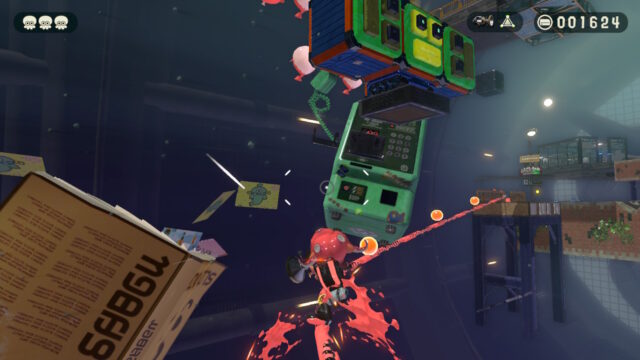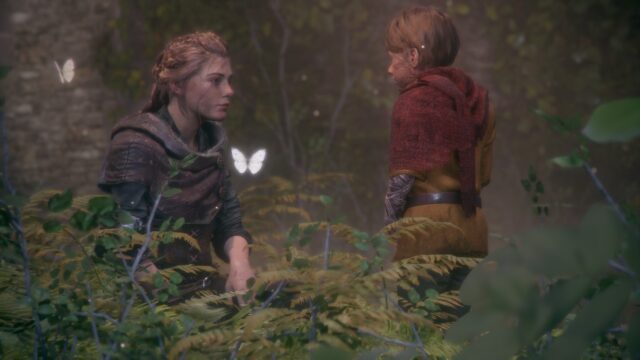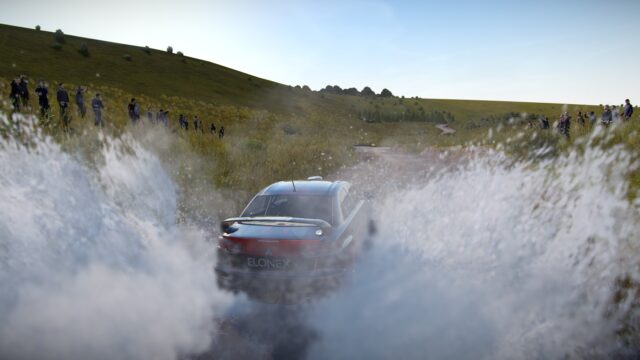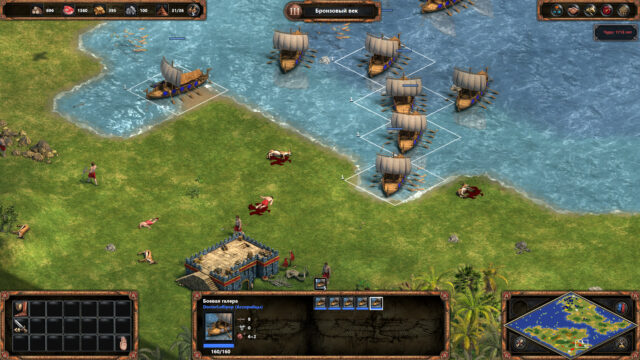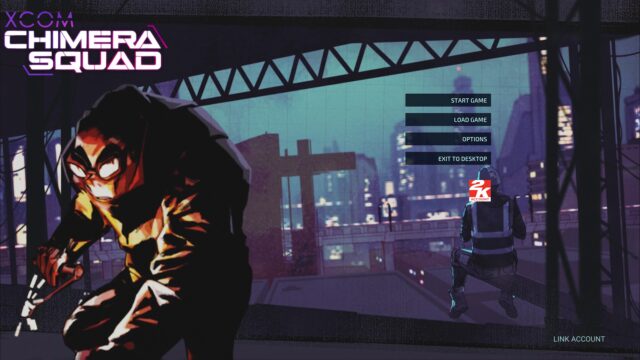Assassin’s Creed Odyssey Review
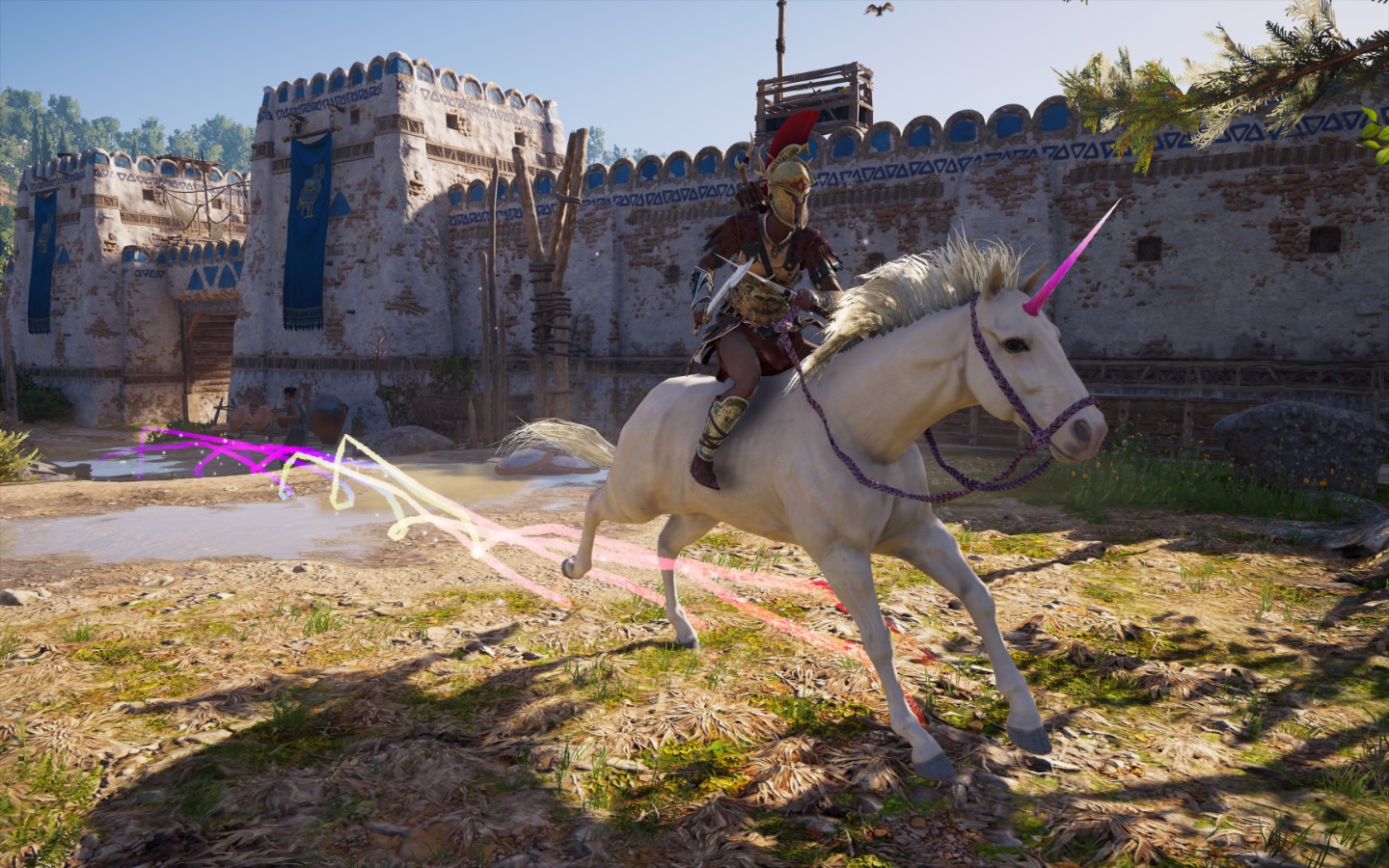
Greetings, traveler. Walk with me through this strange garden, rest in the shade of the olive trees, and I will tell you a story. A story of sacrifices and achievements, of family and betrayal, of grinding and looting… ahem-ahem.
I do not claim to rival the “Iliad” in competition, but I believe I can handle the task at least as well as Homer from Springfield.
You probably already know that Assassin’s Creed has regained its spirit, the conveyor is running at full speed, and the folks from Ubisoft Quebec, who made a controversial but charming impression, Syndicate Confidently conquering a new historical era for the series, leaving last year’s sand dunes with pyramids far behind… Well, or ahead, because technically the events of the new installment unfold several centuries before what we saw in “Origins”. Now, in all its glory, Ancient Greece during the height of the Peloponnesian War is presented to the player. Yes, that very one. Did you Google it? Great, because you’ll have to do it more often. Moreover, the more often, the better.
You see, despite the fact that the advertising campaign presented Assassin’s Creed Odyssey as some kind of “true” immersion into a historical era, they forgot to even add a brief encyclopedic summary in the game about what the plot revolves around and our hero.
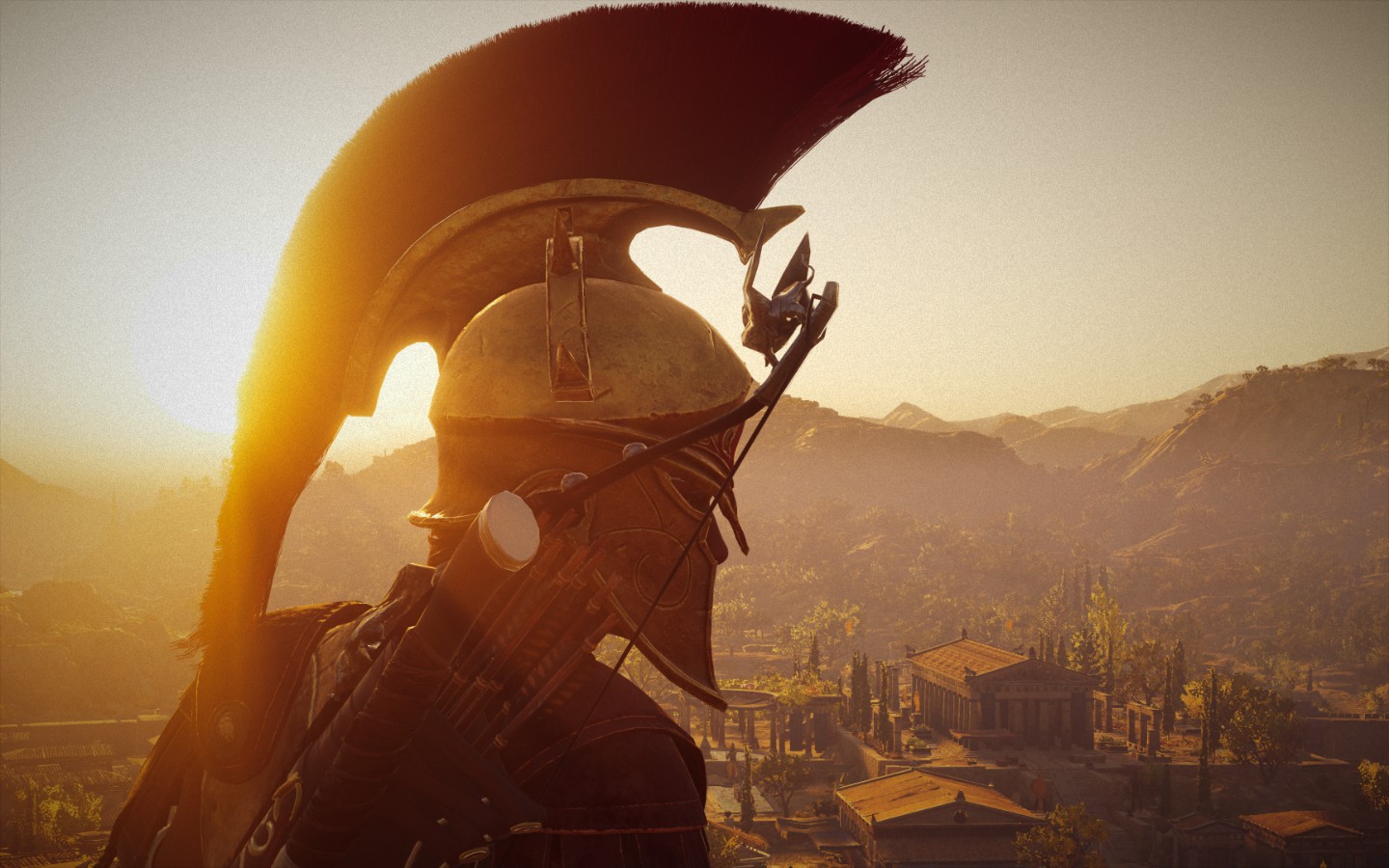
At the same time, the characters in the dialogues behave as if we all remember perfectly well the essence of the conflict between Sparta and Athens and who Teres is. Maybe I’ve gone completely mad with my video games, but I get the feeling that I’m not the only one who at some point exclaimed, ‘This is madness!’ and went back to brush up on the game mechanics.
Previously, there was an abundance of reference information in the series – sometimes you didn’t even see anything remarkable in another stone ruin, but the game would tell you: “What are you talking about! This is the most famous architectural monument! So much was happening here…” Now, the degree of the infamous “immersion in the era” partly depends on the player’s desire to take a break and browse a couple of encyclopedias… okay-okay, “Wikipedia” – let me romanticize a little, huh! However, the reward for the efforts is much more valuable than any loot that can be taken from a defeated enemy.
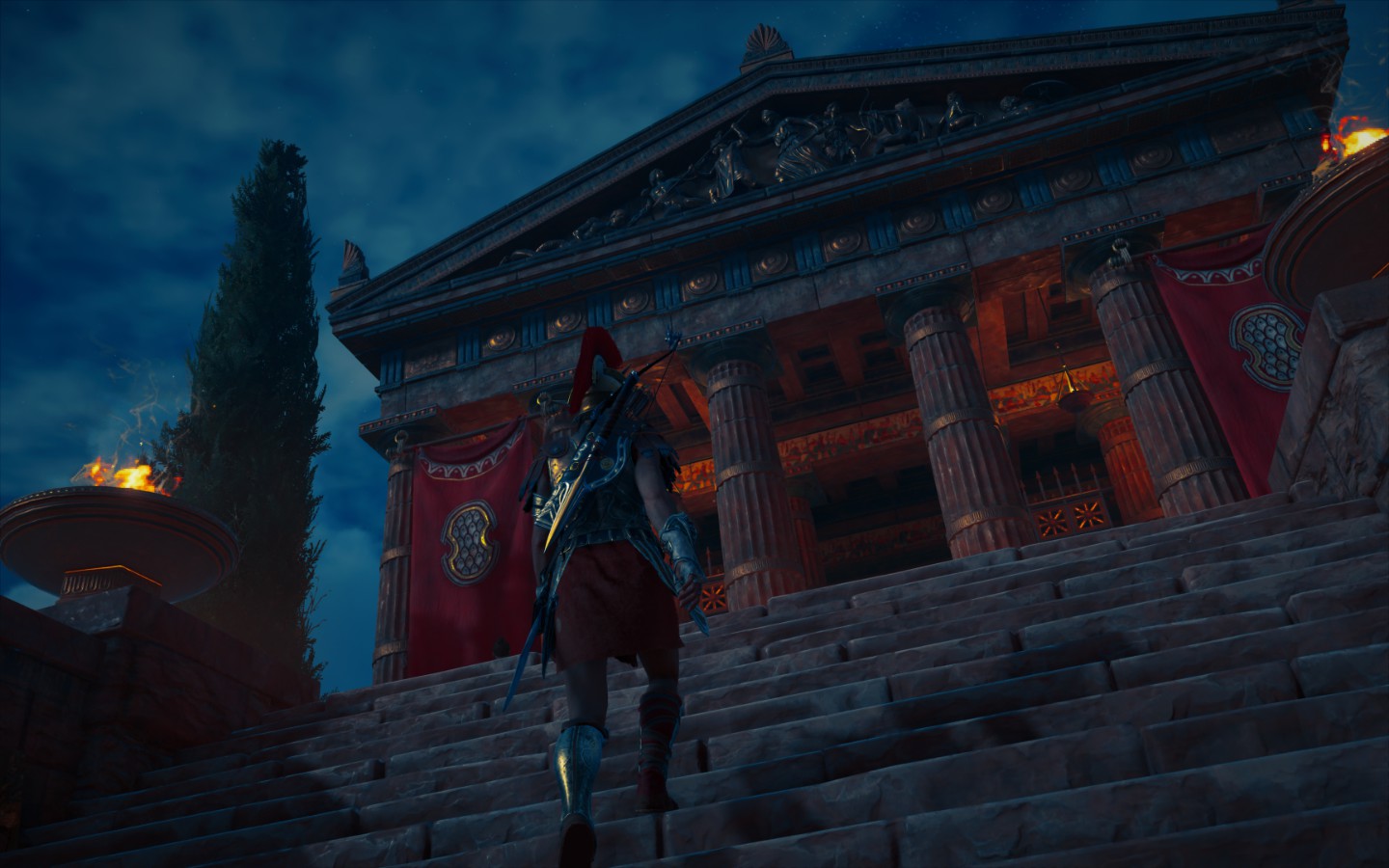
The game flourishes when the resounding Parthenon, Pericles, Corinth, and others on the list cease to be an echo of the school curriculum or children’s gatherings with a book on mythology, becoming enriched with details of historical chronicles and descriptions of the intricacies of life at that time.
It is known that a special encyclopedic mode will be introduced later, as was the case in Origins, but why did none of those responsible think that “the road to lunch is paved with a spoon”? It is unclear.
It so happened that I never got to immerse myself in “Origins,” so this review will be from the perspective of a player for whom the current form of the tower simulator is still new, and therefore comparisons with last year’s installment should not be expected. I consider myself a fan of the series, but after several consecutive “misses” in the AC series, I had no faith that juggling with other genres would lead to anything good, especially considering that Ubisoft’s first attempt is usually a failure. It is all the more remarkable that Odyssey managed to dispel my unwarranted skepticism.
So, what does the player encounter immediately after the warm welcome to prehistoric Greece? First and foremost, the story, which this time tells of the descendants of King Leonidas – the bearded Spartan who famously kicks people into the abyss. By the way, he actively engages in this here as well.
You will have to choose between a brother and a sister, and although it seems that this choice is purely cosmetic, rumors are already circulating that playing as the female character is considered canonical. It depends on personal preference – personally, I couldn’t resist the allure of Kassandra and quickly embraced the portrait of a “warrior girl in ancient times BC.” Especially since internet research has established that women in Hellas sometimes did not hesitate to take up arms, and it turns out they were not the only Amazons. That’s how it is, grumblers. Save your accusations of feminism – better brush up on your historical context!
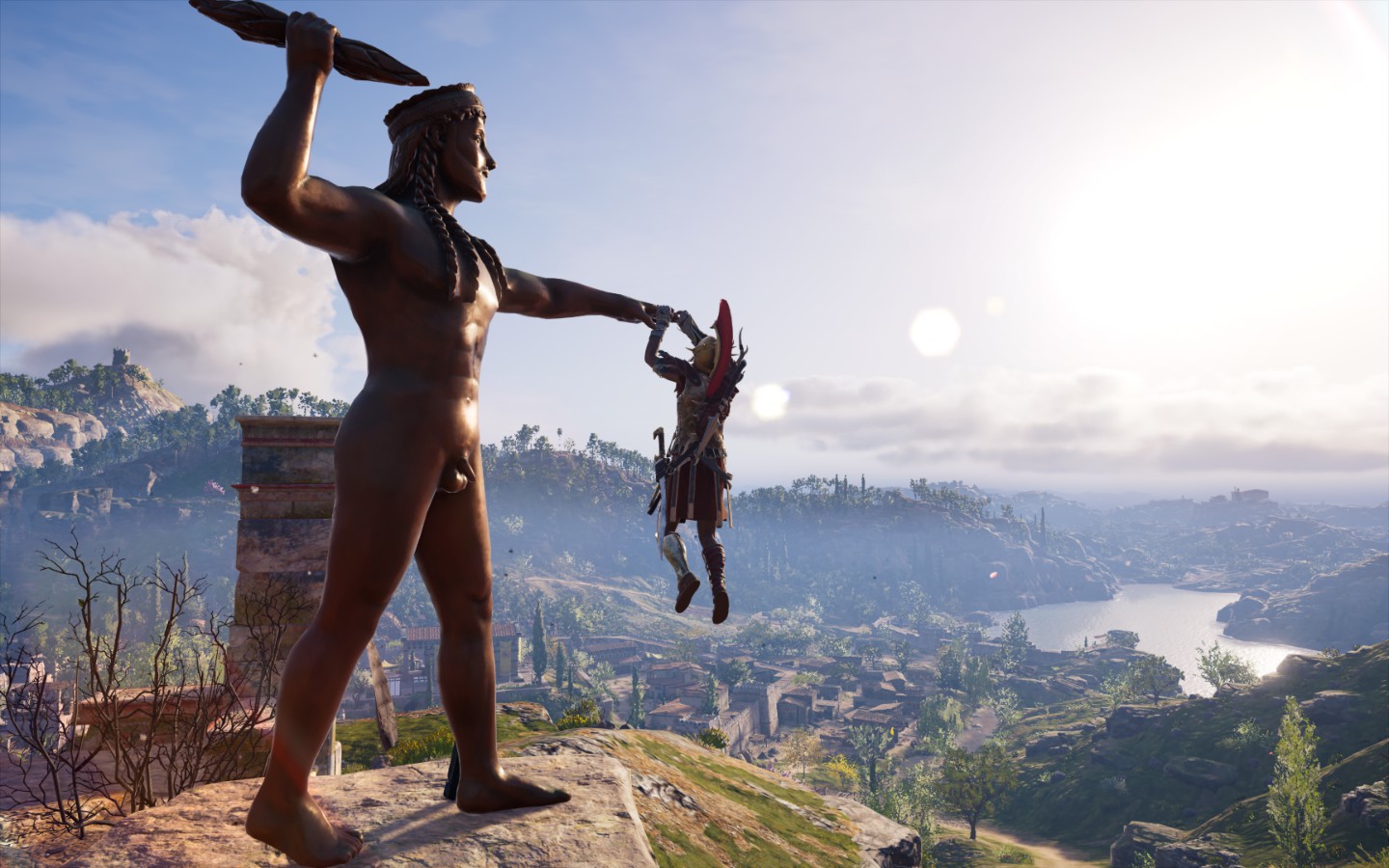
You won’t believe it, but this time our protagonist doesn’t join the Avengers due to personal circumstances – for once Ubisoft decided to deviate from their favorite template, so the scriptwriters had to work hard. And they know how to do it when they try: the story, although not reaching for the stars, will surprise with unexpected twists, and overall the aftertaste remains pleasant. That is, if you don’t lose the thread of the narrative by grinding levels just to move on to the next plot act.
This leads to the main problem. The “Store” tab in the menu exists for a reason – without the boosters for experience and money sold there, your personal Odyssey will drag on. The game is truly huge and abundant with all kinds of activities, but the game designers have done everything to make it take much more time to complete if you decide not to pay for the imposed comfort.
Ironically, in a game that wants to belong to the freedom-loving RPG genre by its nature, they constantly try to deprive us of that very freedom, dictating how and in what order to explore this world. For example, several times it is discovered that you can’t just start a new story act right away because the recommended level for the next quest has increased by several points, which means that even the most ordinary enemy will be perceived as a boss from Dark Souls.
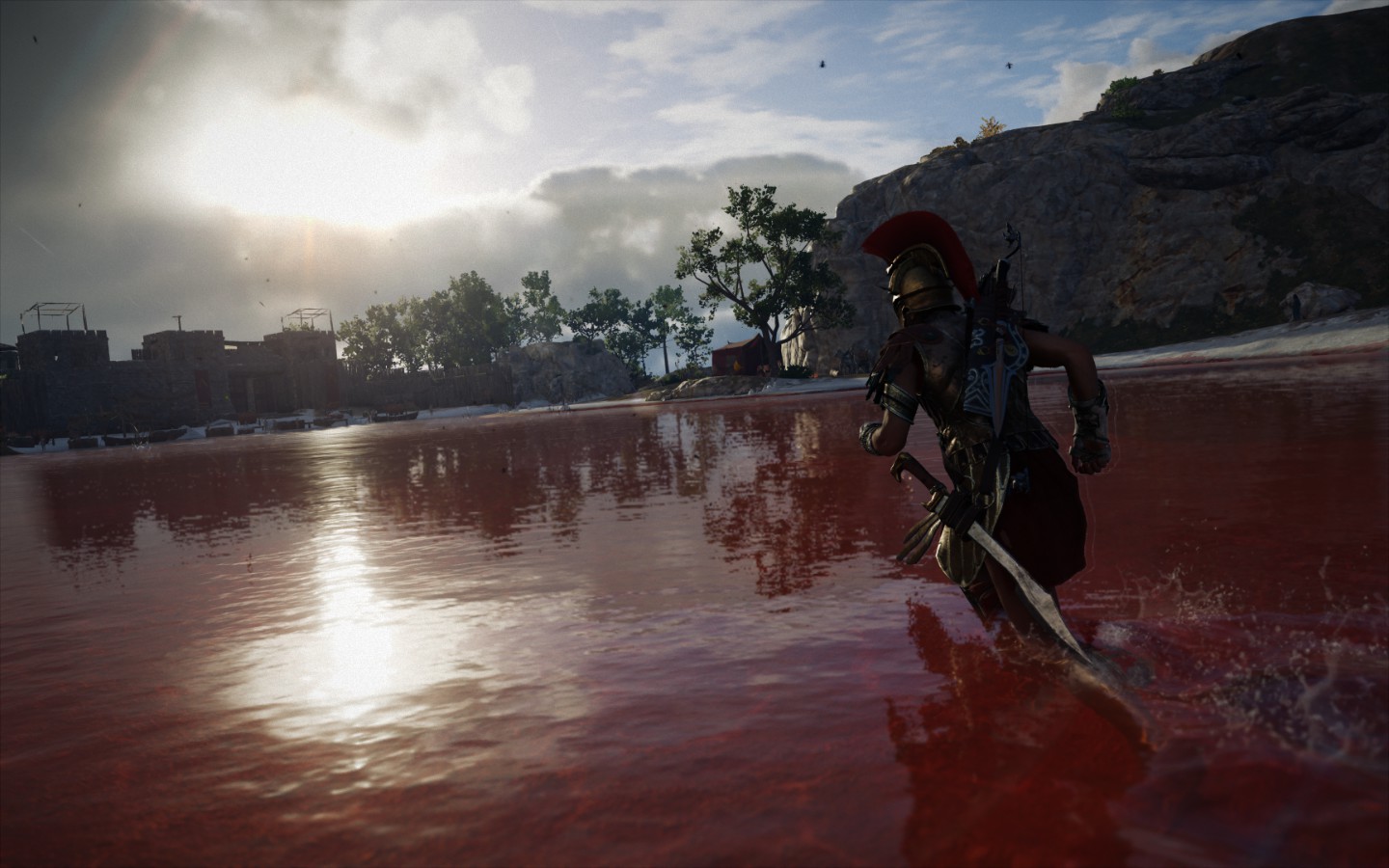
It would be bearable, considering the scale of the world and the number of buildings, tombs, and side quests to discover and explore, which is incredibly interesting. However, it turns out that all the locations have recommended levels, just like in your MMORPGs, so most of the local areas will not welcome you.
So, there is a huge map, with plenty of intriguing places you want to visit, but you can’t visit them – first, you need to gain enough experience in the “appropriate” locations. It’s just the most epic shot in the foot that I’ve ever seen! They forbid you from independently exploring the world, and at the same time, they regularly pull you out of the main storyline to search for something that will level you up enough for the next episode. Need I say how this affects the narrative dynamics?
I think that this… feature, combined with the significantly changed appearance of the series, may deter many old fans. It’s a shame because they will miss out on one of the most exciting parts in the history of Assassin’s Creed! I don’t know how it happens, but if you find the strength to break through this carnival of audacity by major corporations and manage to catch the right rhythm, you will surprisingly discover that you simply can’t tear yourself away from the game. I say this as someone who has spent almost a whole week not leaving the house beyond a couple of hundred meters and whose consciousness has almost completely transported itself to the times of tunics, pantheons of gods, and other amphorae with frescoes.
The era is portrayed in all its exceptional beauty. Walking through the streets of virtual Athens, you can’t help but be amazed at what a great civilization it was and how many important things for humanity originated here: science, medicine, drama, oratory, democracy – these are just a few examples from the surface. Of course, it is not known for certain how everything actually looked, so it is difficult to assess the degree of artistic imagination in visualizing the appearance of the cities, but how much one wants to believe that it was all like this!
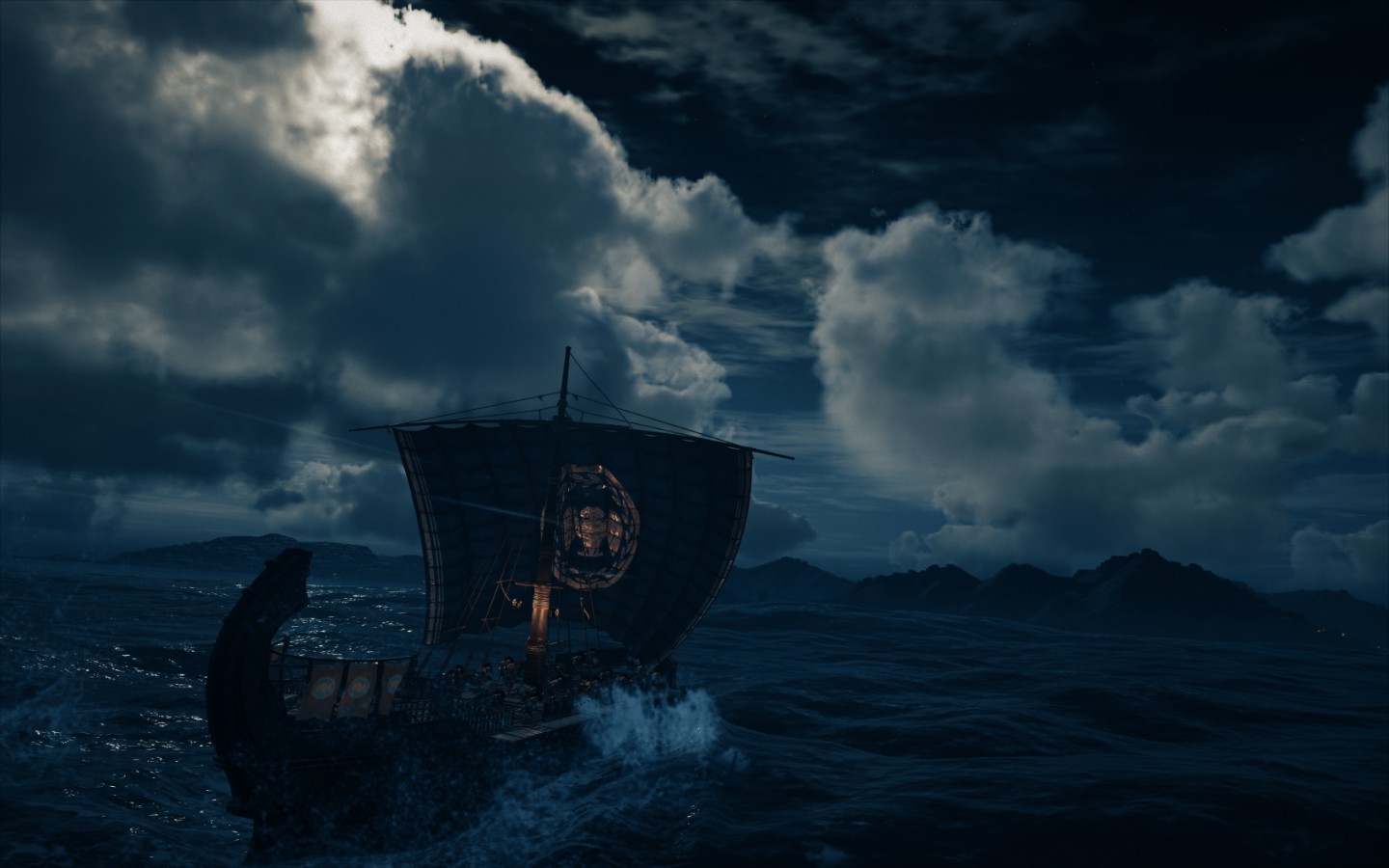
Nevertheless, as can be fairly noted from the title, Assassin’s Creed is primarily a game about assassins, so it is important to talk about the means by which we will carry out our story. The new combat system is a complete mixture of foreign ideas, successfully intertwined albeit not perfectly. Here you have a complete set of sensations from the legendary measure of the entire industry in the form of the third “Witcher”, and the ugly twin sister “Nemesis” from Shadow of Mordor, and – suddenly! – a little Bayonetta in the form of a short-term “slow-mo” when successfully avoiding an enemy strike.
Overall, this added more depth to the battles, but almost completely destroyed the former spectacle and grace, turning the battles into a simultaneous chaotic and sluggish swinging of blades. Well, and don’t forget about the stupidity of artificial intelligence – it’s hereditary for the game. The guards are no smarter than a stool, I swear.
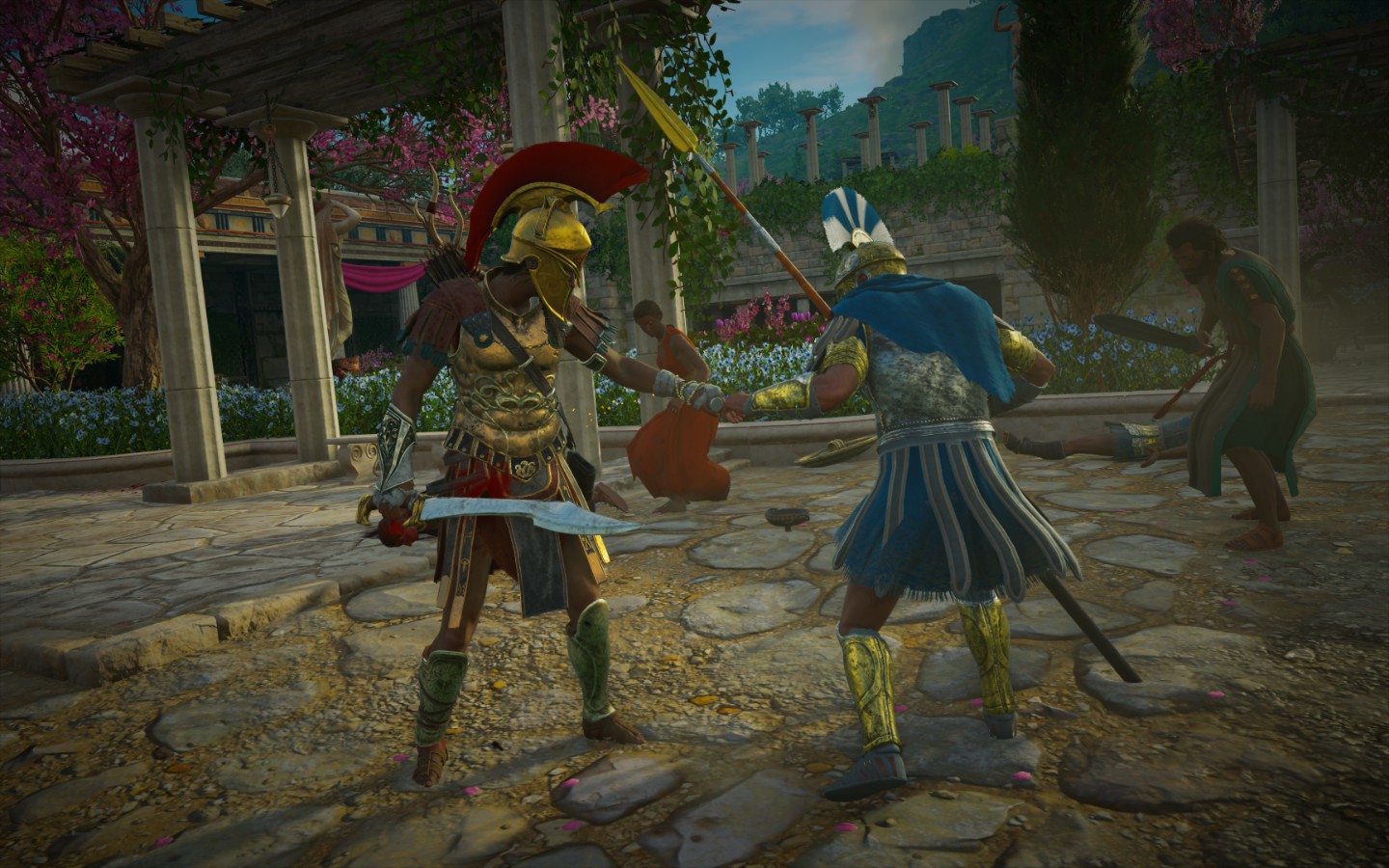
The loot system resembles a hybrid. Destiny 2 any fantasy RPG like Diablo. Equipment has different degrees of rarity, and the more exotic an item is, the more special attributes it possesses, such as “+5 to health” or “+10 to damage against Spartans”. Just like in Destiny, you can upgrade your favorite item to the current level and not part with it until the end of the game, but it will require a lot of resources for such pleasure. However, if you suddenly become lazy to search for iron and wood again, the noble guys from Ubisoft are always ready to “save” your time for an additional fee.
It seems like all the attributes are in place, but by the middle of the game, when you have determined your combat style, it becomes clear that all these piles of “stats” are essentially unnecessary. The main thing is to make sure that your equipment is more or less at the current level, and the rest is just a superficial desire to seem deeper than you actually are. What colleagues overlooked here is transmogrification, which is sorely lacking: sometimes you just can’t control yourself and leave weak gear on your character simply because the new one doesn’t match everything else.
Smoothly transitioning to the conclusions, it is almost equally tempting to praise the game and give it a good slap on the wrist – it is sometimes frustrating to come across those problems and roughness that could have been easily avoided. Many elements seem intentionally unfinished, so that there is something to flourish in subsequent games – the most disappointing in this regard is the concept of dividing locations into spheres of influence.
It’s like there’s a war going on, like you can sabotage the situation in the region and provoke a massive battle for territory, but in fact, it doesn’t affect anything, and the “wall-to-wall” battles themselves quickly stop being perceived as something epic and important, but only as an event at the end of which you will be given money and a rare equipment item.
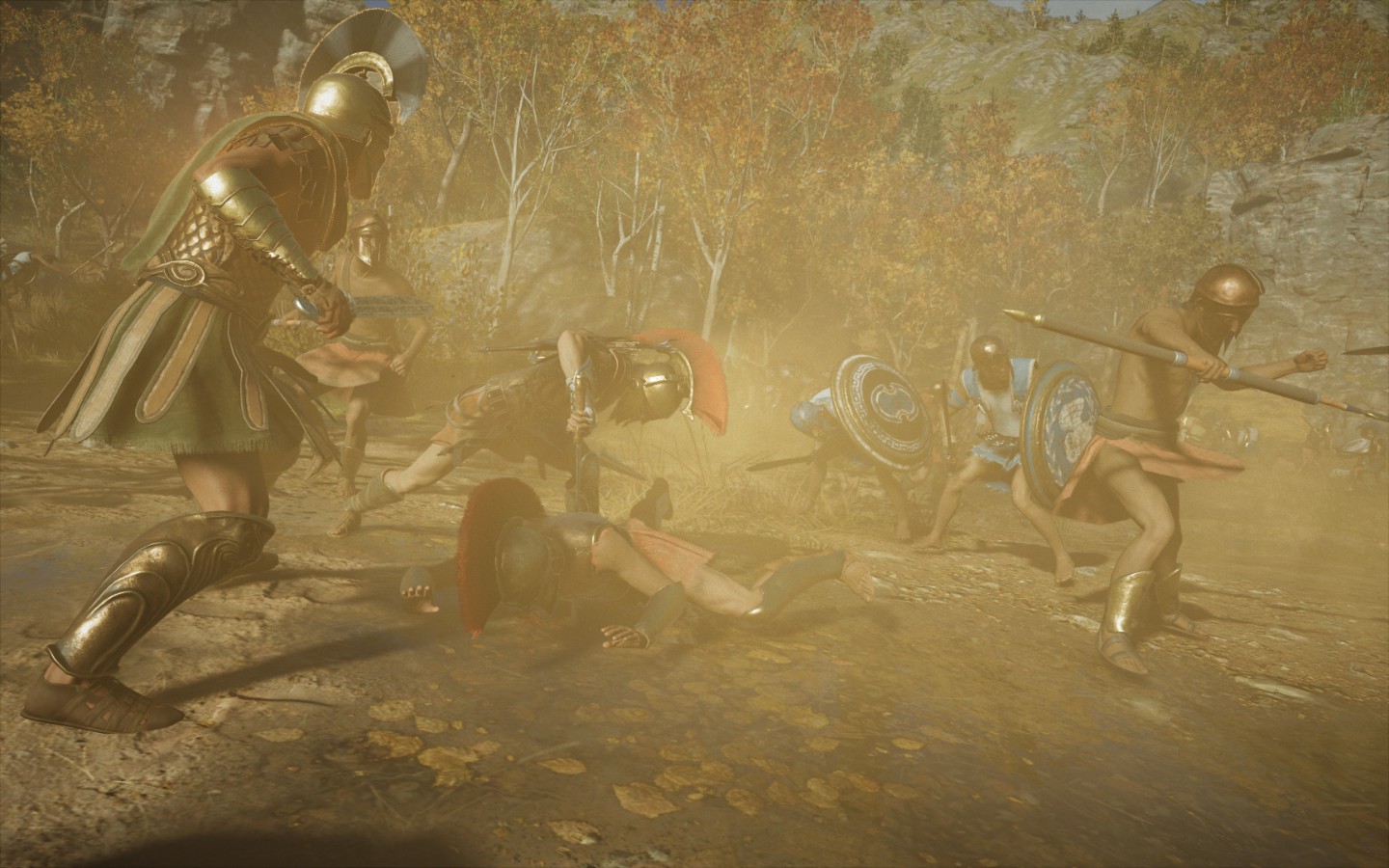
And there is no reputation system yet. You can swear allegiance to one side of the conflict, and then, around the corner, cut their fortress, taking a couple of contracts to destroy the fleet, so that in the decisive battle you can still fight under their banners and win. That’s the life of a mercenary – unprincipled and pointless.
Assassin’s Creed Odyssey is a project of incredible scale that you want to immerse yourself in completely. Yes, it’s not the same game as before, but is that really a bad thing? The series has finally emerged from a state of stagnation and self-replication, apparently trying to slowly move towards a responsible step and ultimately grow into a full-fledged role-playing game. Let’s wish it good luck, and to the major publishers – adequacy in their quest to make money on a popular franchise.Read my new book. Review of Assassin’s Creed Valhalla.
Share
Discuss
More Reviews

